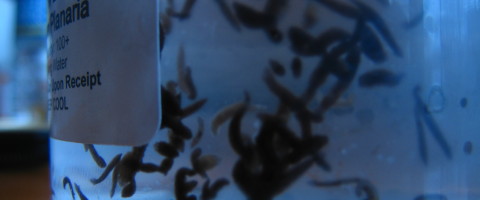Somewhere dark and anonymous, a low-hanging lamp illuminates the deepening shadow of dread on a troubled face. Lights on wall-mounted cameras blink in the darkness as documents and test results are waved in front of sunken eyes.
‘These are your results, are they not Mr Mann? You recognize them don’t you?’ The interrogator had relentlessly chattered for endless hours wearing Mann down until he was too weak to offer a fight.
‘Have you heard of Dynamic Genetics Mr Mann? Well they’ve heard of you Mr Mann! They’ve heard of you because there’s a bit of them in you Mr Mann!’ The voice of his interrogator made no effort to cloak the joy derived from his victim’s suffering. Mann could barely move his cracked lips before the torrent continued.
‘You do understand, don’t you, Mr Mann? Because this little test we did, just a harmless little test Mr Mann, showed that somehow… somehow you have material that Dynamic Genetics own in your genetic makeup Mr Mann! Imagine our surprise!’
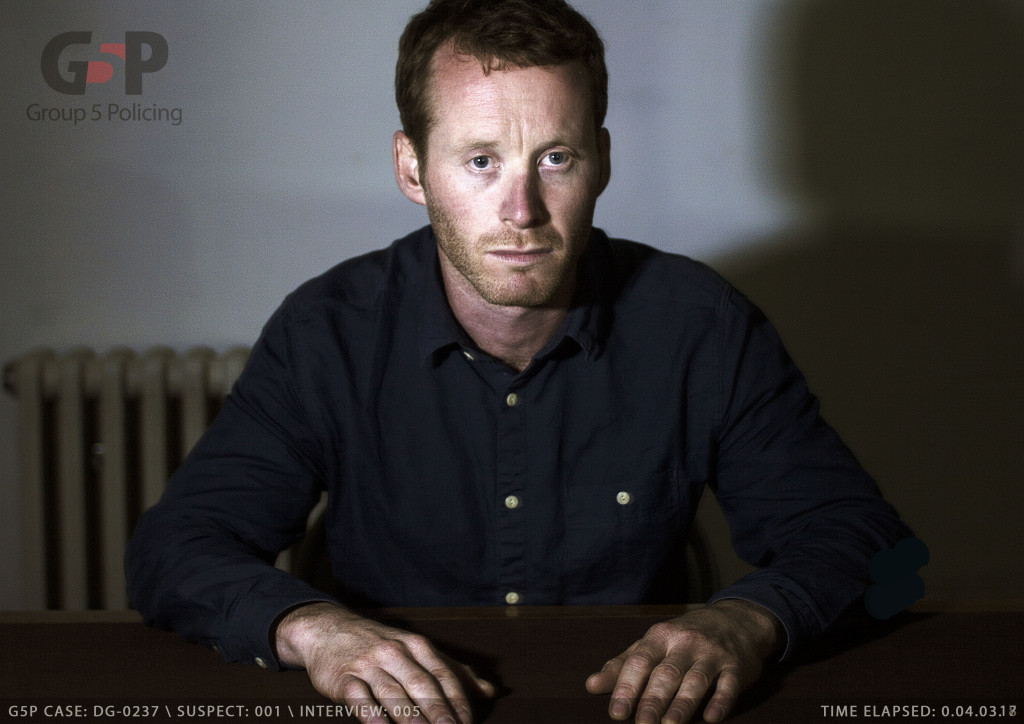
‘I-’ whimpered Mann.
‘Ah but wait Mr Mann, because, there’s more!’ leaning forward towards Mann, breathing heavily into his face. ‘It seems that my esteemed clients at Dynamic Genetics have no record of you having this material, Mr Mann. Can you imagine? And I do have to say, they are most excellent record-keepers, my clients,’ he hissed. Mann attempted another protesting murmur from his parched throat before the oppressive force of the interrogation continued.
‘Moving on Mr Mann,’ His face now just inches away from Mann’s. ‘Take a good look at these.’ He shoved a stack of photographs towards Mann. ‘We’ve been watching you Mr Mann. It seems you have been very busy going and back and forth from a well known, how shall we say… ‘clinic of ill repute’ out in the dumps.’ Rattling off a machine-gun like chuckle, the interrogator continued: ‘Yes, Mr Mann, you posed very nicely for our surveillance teams! And then there’s your medical data! And as we all know, the data never lies. Well Mr Mann, what do you say?’
The interrogator paused and moved back, taking Mann off-guard. He stumbled over his thoughts to gather what feeble arguments he had while the darkened figure of the interrogator loomed imperiously over him. ‘I- I- I don’t know what y- I mean, I have noth… I want to speak to a lawyer, I have, I have the right to…’ But his hopes of defiance came out as a meek plea for leniency, the ears of his interrogator twitched at the unspoken sound of submission.
‘Oh Mr Mann, come now. We went through all this yesterday. You’re not eligible for legal aid Mr Mann, and to be truthful to you, Mr Mann, and I do hope we can be truthful with one another, no private lawyer would shoulder the risk of supporting you, not without a significantly higher premium than you are able to offer Mr Mann. It really is a most regrettable situation Mr Mann, but it’s simply out of my hands.’
He paused again, leaving a note of mock sympathy hanging in the air as Mann sunk deeper into despair. Straightening himself, and walking towards the door: ‘I’m afraid Mr Mann, and please believe me when I say this, I am afraid that your fate is entirely at the whim of my client.’

Arnold was what could be called a model citizen, that is to say, unremarkable. He paid taxes and premiums, he tried to keep ahead of his peers by up-skilling when he could find the time and maintained comfortable metrics. Security, in whatever form it could be had, was his, and he was happy to bear the anxiety of a forever unremarkable life in exchange for the meek scraps of assurance offered by the state and the corporations.
That is not to say that Arnold was ignorant of the world he had inherited and the thick, sickly seams of fear and darkness within it, but he did his best to protect his equally unremarkable family from it. To shield them from the blackened, bloody realities that crept in through the networks of media hubs and back streets of the city. But as the years went on and Arnold got older, technology begin to outpace him and he grew progressively more apprehensive about securing his place in the world.
There was nothing, however, to gain from facing his fear. He believed that by doing so, he risked releasing it upon his family and bursting the bubble he had built for them. So Arnold resorted to the only thing an unremarkable man can do: he waited and he hoped.
Then the new government entered office on a wave of popular support. They promised an end to insecurity, to vanquish the fears that Arnold harbored for all those years. To build a state that worked for conscientious individuals like himself. He remembered the feeling of relief. A heavy weight fell from his shoulders and he was buoyed by the unfamiliar sense of pride, excitement and hope that gripped the nation.
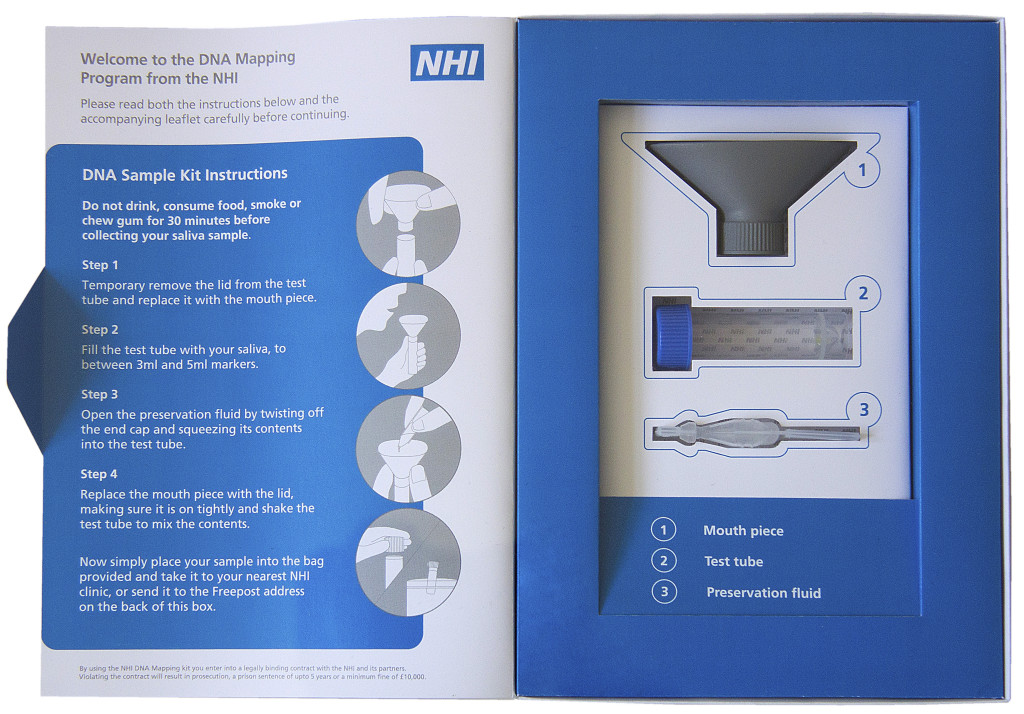
Just as the celebrations ended, the package arrived. A letter explained that he was one of a privileged few to be selected for a first round of genetic sampling for the new government database. His family gathered around as they examined the plastic pipettes and swabs and joked about the remarkable Arnold. Excitedly, he sent the samples off and awaited the results, results which might finally give him a sense of his place in the world.
Almost six weeks passed without a reply, then one morning while checking his inbox he noticed an email from a ‘.gov’ account. Arnold tapped the attached app and the repurposed National Health Insurance (NHI) logo briefly took over the screen. They had algorithmically analyzed his DNA against their growing database. Relief swept over him as he read that the algorithm had classed him as healthy and comfortably average. But, further down came a short caveat; there were some risky indicators. Nothing he should worry about, but he was required to call a helpline and book a consultation.
Curious and mildly anxious, Arnold made an appointment to see a NHI genetics consultant. The clinic was curiously un-medical. Devoid of the smell of disinfectant and the buzz and chatter of the few hospitals he had visited. A young lady in a blue business suit directed him to the consultant’s office where Arnold dutifully nodded his way through a deluge of information he could barely comprehend. Nonetheless, the comforting tone of the consultant’s voice left him feeling assured, if perhaps a little bewildered about the miraculous new age of medical science he had found himself to be a part of.
Then one crisp April morning, his Citizens Contribution Contract arrived. He must have spent hours at the table poring over his screen. Frantically scrolling up and down, he tried to find a hidden link that might explain the scale of the thing before him.
He pinged the NHI and CCC helpdesks over and over again, but every time he received the same reply: Their records showed he had talked with an NHI consultant, had been warned of the malignant risk lurking in his DNA and of the effect this would have on his insurance premium. The window in which to query his results had long since passed. He tried to search his memories of the consultation. What had he missed in that confusing and confident barrage of data that had left him so reassured?
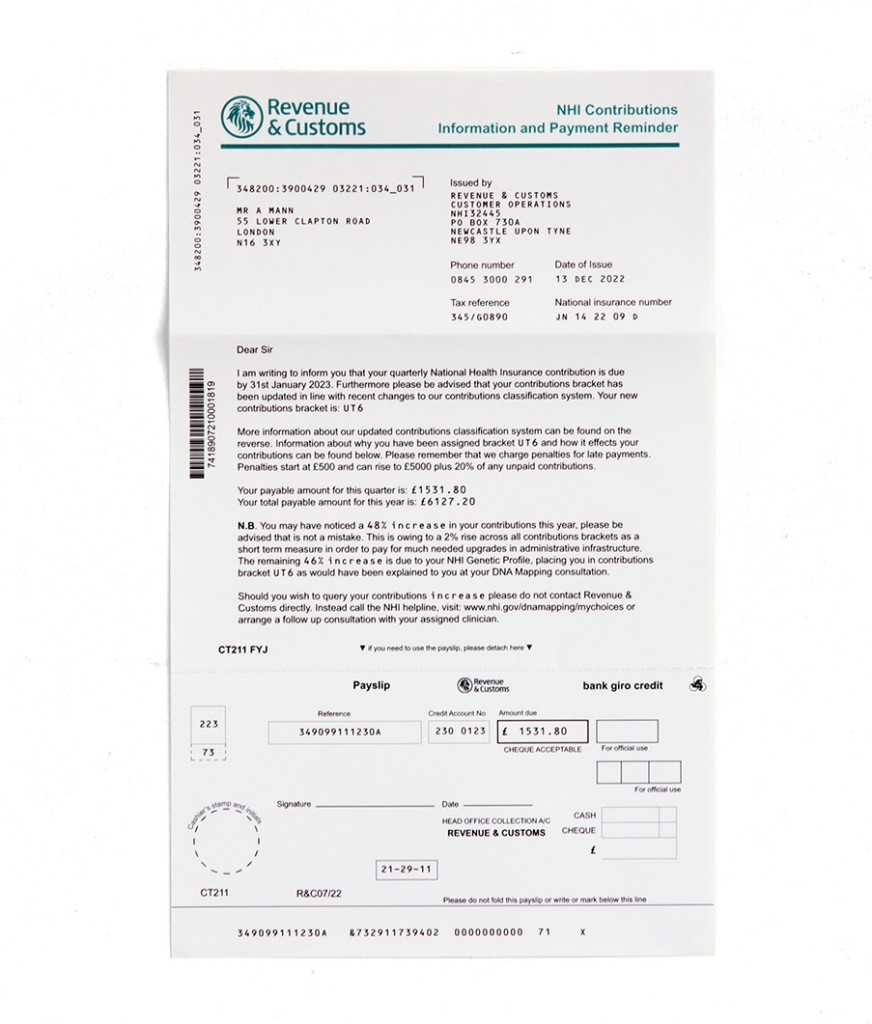
The premium was unaffordable. But he had no choice. This was, after all, the legislation the people wanted, it was better for society. The alternative was a corrective procedure—a genetic alteration at one of the government licensed research clinics. It would lower his genetic risks, and his premium, but being outside of his NHI contract, it came at a staggering price.
He pored over spreadsheets and financial plans. He tried to bury the cost of balancing the risk in his DNA, the risk that the state had decided was an unpayable debt. Lines of anxiety crossed his face as he contemplated the inevitable. In months, his family would begin to suffer, in years they would lose everything. He considered escaping with his family and starting again. But where would he go, they had his very DNA. The procedure would save him, but that again, was a distant impossibility.
Looking for answers, Arnold returned to the NHI Consultancy. He strained to understand the consultant who, in the same confidently detached tone, explained the technicalities and rational behind the grave judgment on his life. Shaken, Arnold stepped out of the consultant’s office, the feeling of fear and despair more palpable than ever. As he was about to leave, the receptionist caught up with him, surreptitiously slipping a thin card into a handshake. ‘My brother’s clinic’ she whispered with a nervous smile of reassurance.
Once outside, Arnold turned the card over. Just an address on the outskirts of the city. No number, no name. Climbing into his car, and with only the rising tide of dread waiting for him at home, Arnold Mann set off to the far edge of the city.
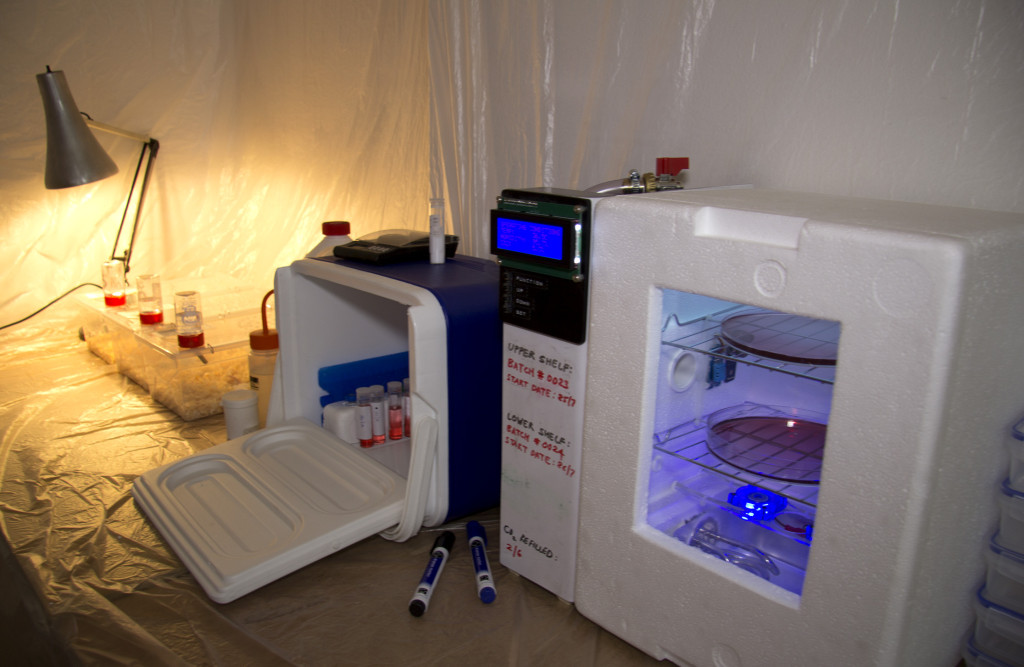
When this government was elected to power, it was under the clear mandate of removing the inefficiencies and internal conflicts that had besieged the state for far too long.
We shall never shy away from addressing the challenges that matter most to those we answer to—you, the people of this great nation. We are duty-bound to restore our rightful place as a global leader in innovation and finance.
By our decisive actions we are proving, to you the public, and indeed the world, that it is a duty we take very seriously indeed. We are building a modern and reformed state ordinary citizens can afford, with flexible and fair taxes. Modernizing our government services, our infrastructure, and our industry. Making sure we are not just competing in the global economic race, but succeeding in it.
If proof were needed of our commitment to reform, you need look no further than our revolutionary work in healthcare, where we have transformed what was a failing and over-burdened National Health Service into the modern and competitive National Health Insurance service. Redesigning its very operating principles from the ground up, incorporating the latest research and innovation to ensure that not only is it the service the nation needs, but, after decades of debt and inefficiency, a service the nation can afford.
We forged new relationships between the state and the private sector, relationships characterized by openness, fairness and cooperation. Now, for the first time, we have medical professionals ready to engage with the social and economic realities of the people. For the first time we have a health system that utilizes the latest genetic technology to deliver specialized treatments to meet the needs of all.
For the first time, we have a small government that uses big data to make wise and informed decisions on everything from government policy to personal tax. For the first time, the greed of the few no longer burdens the lives of the many.

Appendix
This essay is part of an ongoing project ‘Dynamic Genetics v Mann’ by Superflux, exploring the future of synthetic biology. History has shown that political and economic forces have just as great an influence on the development and application of technology as the aspirations of scientists and engineers. With this in mind the project explores not only the technological trajectory of synthetic biology, but by extrapolating current social, economic and political trends, it aims to ground the technology in a wider cultural landscape.
It imagines a world where synthetic biology and gene therapy have moved into the marketplace. In this world, the state’s responsibilities have shifted from healthcare provision to the provider of health insurance. By calculating the healthcare implications of specific gene combinations, insurance rates are adjusted on a person by person basis, ensuring that individual ‘contributions’ accurately reflect the potential costs associated with their genome.
What new laws and economic models might emerge under these conditions? How will intellectual property be applied and policed when designed genetic material makes its way into people’s bodies and their lives? Who will be the winners and losers in such a world?


